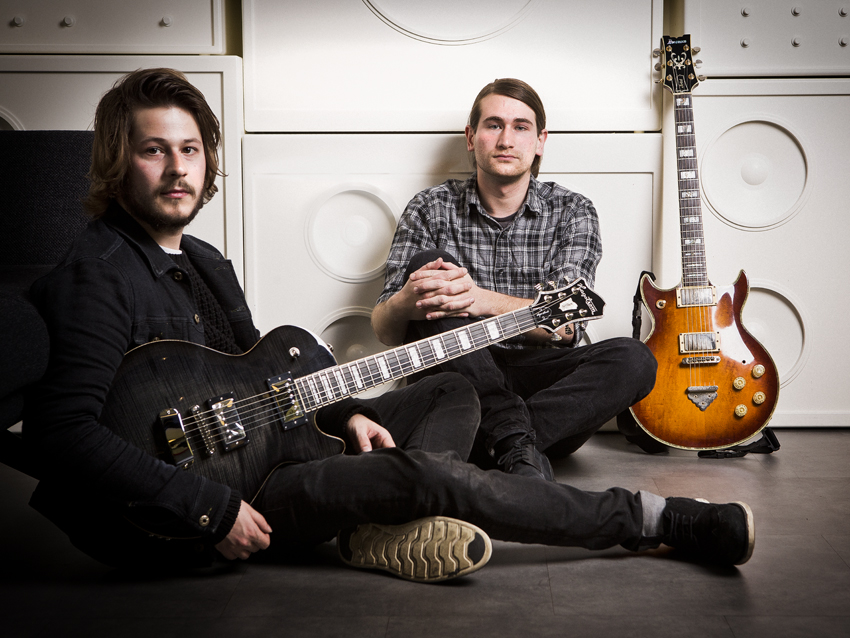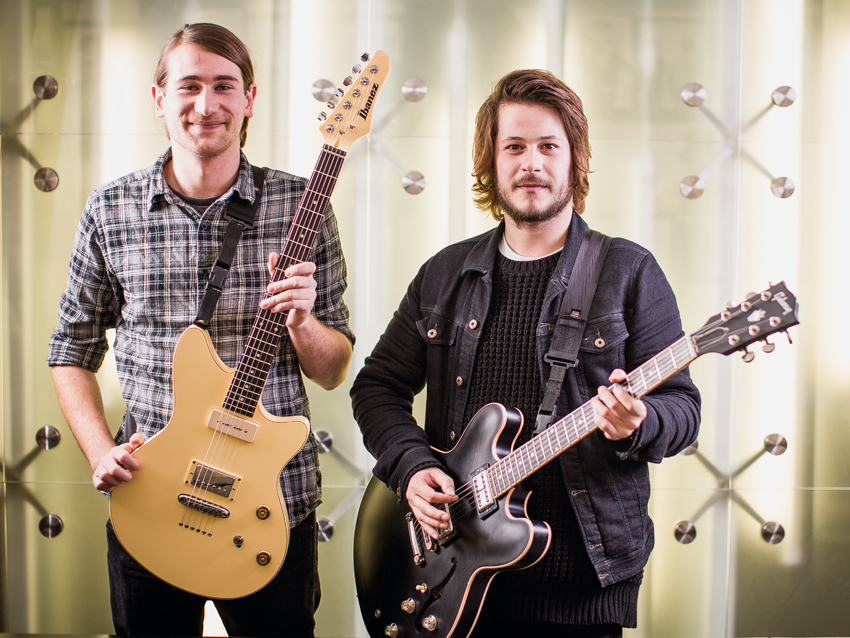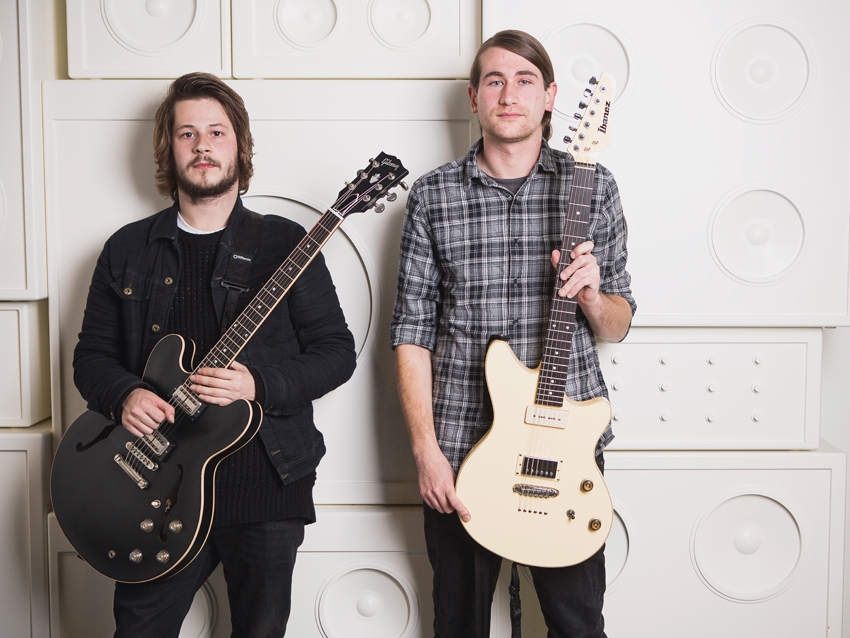You Me At Six talk number ones and rocking arenas
"We're not just a small rock band from Surrey anymore."

You Me At Six talk number ones and rocking arenas
On the 8 December 2012, Surrey five-piece You Me At Six headlined Wembley Arena – the final date in their Sinners Never Sleep album cycle.
It was the crowning achievement of their seven years as a band, but as the crowds parted the question remained: what next? Even the largest contemporary bands don’t dare to dream far beyond Wembley and the top 10. Crucially, though, You Me At Six don’t think in terms of don’ts.
And it’s a good thing, too: young UK rock groups don’t headline the Astoria as an unsigned band. They don’t crash into the top 30 with an indie-released debut album. And they don’t have three gold records before they’re 25... But that’s not stopped You Me At Six from doing all of the above.
So how do you top that? Well, returning with a number-one record in Cavalier Youth is a good start. We met up with the guitarists at YMAS’s London label HQ the day after their chart victory and found the place in full party mode. Fortunately, Max and Chris opted to share the afternoon (and a few beers) with TG to recount their six-string success story...
How did you celebrate your first number one album?
Max: “Well, I was quite a wet boy! I had a beer with my parents and they cracked open a bottle of champagne. Then I had a roast dinner and we all went out to the pub.”
Chris: “I may have had some midday pub action – a few pints of Peroni and some chips – and then I’m off on holiday, so I was packing my suitcase!”
What were your aspirations when the band formed eight years ago?
Chris: “We didn’t have any!”
Max: “No, it was just fun. All of our friends would go down to the same venues every week. Guildford Backline was basically a hub for us when we were growing up because you could put on your own gigs there. You’d get between 200 and 500 people in this really small venue, all just having a good time.”
Chris: “Half the people there were in bands as well – so we’d be taking turns to play each week. We had no expectations, but people started coming from further afield to see us, and it went from there.”
Who were your guitar influences back then?
Max: “For me, I grew up on a lot of Nirvana and Blink-182. It was more or less Kurt Cobain and Tom DeLonge that I was looking up to. I loved how simple, but hard-hitting Kurt Cobain could be. And then Tom DeLonge was the pop-punk king of guitar.”
Chris: “Mine was very blues-based, really. My dad was a guitarist, so he would always be sat with an acoustic playing John Lee Hooker. Then my cousin, who is probably one of my biggest guitar influences, was always big on blues. Then, from there, I sort of branched off into Tom Morello territory, and Mike Einziger of Incubus.”

Gear and getting the right vibe
Were you conscious of a need to mature as players and writers on the new record?
Chris: “There’s obviously a mission: to write a better album than your last one – even if it’s just us personally that thinks it’s better – but for me, it’s just us writing songs for ourselves.”
Max: “I really wanted to show off our guitar skills on this CD. I think it kind of hit home to me when I was watching a Parkway Drive DVD, and the whole crowd was just singing the riff. I was like, ‘I want crowds to be doing that to our songs!’ And that’s why songs like Cold Night, Hope For The Best and Room To Breathe came out. I would almost start from the idea of humming it to myself and then put it on the guitar.”
Neal Avron [Fallout Boy, Weezer] produced, why did you go with him?
Chris: “It was about having someone with a great track record and who we felt comfortable trusting with what we wanted to do. In the past we went with GGGarth Richardson and I was like, ‘He recorded Rage, this is the shit!’ But when you think about it, for a band like us, it’s not the best approach. So it was an executive decision that ‘We can trust this guy and we get on with him like a house on fire.’”
Where did you record the album?
Chris: “We did it in LA again. We went to NRG for drums, and after that, we went to Neal’s studio, which is a big outhouse in his garden that he’s turned into a studio.”
Max: “It’s called La Casita, which means ‘little house’ in Spanish.”
Chris: “It’s the only studio I’ve ever been in that you can see the day go by. It’s a white room with these huge church-y windows on the side. For us, it really boosted morale to walk into a nice, sunny room in the morning.” Max: “It revived our recording dreams, especially after Sinners Never Sleep, which was such a tough album to record...”
What was so hard about recording Sinners Never Sleep?
Chris: “I just don’t think that we gelled with the people we were working with and it was a dreary, dark room. I’d get there and be like, ‘Let’s record!’ Six hours later, I’d still be waiting with my guitar plugged-in, and it would be like, ‘Can we do something now?’ Whereas Neal was like, ‘Let’s get in. Let’s work!’”
Max: On the last album, I'd come home at night and be like, ‘Fuck this! We’ve paid a lot of money to be here and record an album and I’m not getting to do my work...’ And that affects everybody. This time round, Neal understood us as people, he knew what we wanted to achieve and he doesn’t fuck about.”
What gear did you use in the sessions?
Chris: “It was different to what we were used to. Everyone we’ve recorded with in the past is very vintage gear-driven, but this time, when I walked in, I was almost a bit disheartened. It was like, ‘There’s a Krank and a new Vox AC30 head!?’ The only old thing was a Marshall JCM800, so everything seemed very tame at first, but when we actually started playing, it all sounded really sweet.”
Max: “Chris also brought a really nice old Fender Deluxe Reverb over, and I brought over an Audio Kitchen amp. We’re a UK rock band, so I thought, ‘Why don’t we promote some of these great UK companies?’ So we took out a Big Chopper and we used that quite a lot and I got this Big Trees pedal, which is like a clean/ distortion valve pedal. Then we varied tones from Vox to Marshall to an Orange AD30 and the Krank.”

Guitars and vindication
What were the main guitars you used when you were recording?
Max: “I took my ’81 Les Paul Custom and my ’85 ES-335 and a ’77 SG. Then I actually bought a new 335 while we were over there. It was one of the Chris Cornell ES-335s with the Lollar pickups in it, and as soon as we plugged it in, it was so different to my ’85 335. It had more balls to it, and I wound up using that for half of the record.”
Chris: “In the past, it’s been Gibsons with big strings – beefy stuff. Whereas this time, the main guitar I used was my Custom Shop Strat, which is a ’50s Relic – and it sounded amazing. I brought five guitars with me, including my signature Ibanez, which sounded great. Then my ’56 Custom Shop Strat, a ’63 Jazzmaster and I used one of Neal’s Strats with two humbuckers and a coil-tap.”
Max: “We also had Neal’s Telecaster and a Danelectro Baritone.”
Chris: “Again, it was a lot of new gear that I’ve always been scared of using because I’m really into older stuff, but it really pulled through.”
Could you have made this record anywhere else?
Chris: “I’d say no. I wanted to record in the UK because we’d had such a bad experience last time, but I think the whole atmosphere and where we were recording and where we were living – you can really tell how positive it was by how the record feels.”
Max: “I almost think it started from the minute we finished Reading and Leeds in 2012. We had our Wembley show and then we went to the Doghouse in Henley and spent five weeks in pre-production there, one week at a time. We’d left our management, we’d left our record label and it was like, ‘Why are we doing this?’ That really started the bonding in the band again. It was like, ‘Let’s just have some fun and be great mates.’”
Was the goal with this album always to go to number one?
Max: “There have been a few targets with this record and number one with Cavalier Youth was the first benchmark, but I’m not going to turn into Billy Big Bollocks because we’ve done it. We want to show why we’re worthy of being where we are today – that we’re not just a small rock band from Surrey anymore. We’ve been doing this for eight years.”
Do you feel you’ve been overlooked in the past? Is this a vindication?
Chris: “Yeah, it’s showing people that you can’t ignore us anymore.”
Max: “Bands like Muse and Biffy Clyro really hold the torch for UK rock acts. It’s like, ‘If they can do it, why can’t others?’ If you look at the best rock acts of all time, a fucking lot of them are from the UK, and it’s about time there was a new wave internationally.”
Chris: “I like being the underdog, though. I like seeing idiots walk around with huge egos after being on TV and they’ll go play to 500 people. Then it’s like, ‘Ah, well, we’re just going to do Wembley. See you in a bit!’”

Dynamite delays
From the first lead line to its drifting refrain, Cavalier Youth’s packed with delay.
Chris: “We’ve always used the Boss DD-20s, but I’ve also got an old Ibanez AD-80. It’s a short delay because it’s an old analogue pedal from the ’80s, but the sound’s great, so I use a DD-20 for all of the click-track stuff, and then something a bit warmer for the looser parts.”
Max: “I was using the Roland Space Echo. I was introduced to them on Sinners Never Sleep and I was like a kid...”
Chris: “It was like, ‘How fast can you break a Space Echo?!’”
Max: “It was a bit! Then I saw my friends The Skints use a Space Echo pedal [RE-20], so I got one, and that’s how the riff in Cold Night came about.”
Cavalier Youth is out now.
For more information visit the official You Me At Six website, or connect with the band on Facebook and Twitter.
Matt is a freelance journalist who has spent the last decade interviewing musicians for the likes of Total Guitar, Guitarist, Guitar World, MusicRadar, NME.com, DJ Mag and Electronic Sound. In 2020, he launched CreativeMoney.co.uk, which aims to share the ideas that make creative lifestyles more sustainable. He plays guitar, but should not be allowed near your delay pedals.


